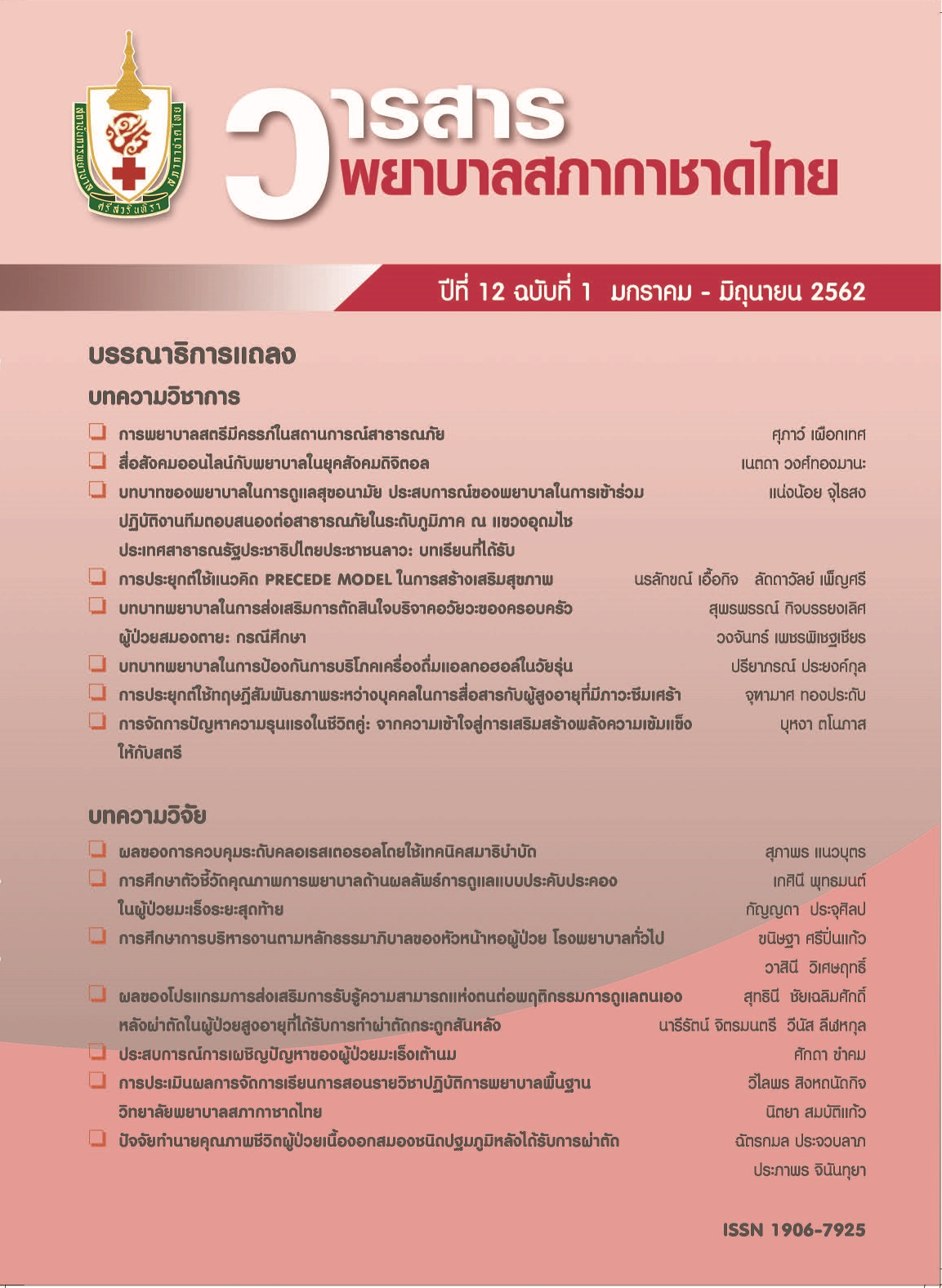Nurses’ Roles in Promoting Family Decisions Regarding Organ Donation of Brain Dead Patients: A Case Study
Keywords:
organ donation, brain death, nurses' roles, patient's familyAbstract
Requesting organ donations from the family of patients who are brain dead for organ transplantation to prolong the lives of others is a complicated and complex process. The success of organ procurement depends largely on the ability of the healthcare team who are involved in this process to effectively communicate with the family to make the decision about organ donation. In so doing, a nurse plays a significant role in enhancing this success. This paper aims to demonstrate how a nurse play the role in promoting family decisions during the process of organ procurement of two patients potentially brain dead. There are 3 steps in an organ procurement process: identification of potential organ donors, making a request for organ donation, and caring for the donor and family when the donation decision is made. The nurse should utilize trained, specialized knowledge and skills including preparation prior to making a request, building rapport with the family, communication skill, and requesting the organs and contents. Nurses who are trained and developed in such skills will help effectively communicate with the family. This will result in successful family decision-making as regards organ donation.
References
2. Titawat W. Ethics of organ transplantation [Internet]. (n.d.) [cited 2018 Jan 8]. Available from: https://www.organdonate.in.th/Download/pdf/ethic.pdf. (In Thai)
3. Na nakorn K, Ratanakul P, Eungprabhanth V. Organ transplantation. Bangkok: Mahidol University Press; 1988. (In Thai)
4. Center for Bioethics. Ethics of organ transplantation [Internet]. 2004 [cited 2018 Jan 15]. Available from: https://www.ahc.umn.edu/img/assets/26104/Organ_Transplantation.pdf
5. Gonçalves AA, Castilho BCS, Rabelo JR, Bedran T. The nurse leading the process of organ and tissue procurement with the potential donor’s family. J Nurs UFPE on line 2012;6(5):1193-201.
6. Villar CR. Family approach for organ donation. In: Valero R, editor. Transplant coordination manual. Barcelona, Spain: n.p.; 2012. p.105-21.
7. de Groot J, Vernooij-Dassen M, Hoedemaekers C, Hoitsma A, Smeets W, van Leeuwen E. Decision making by relatives about brain death organ donation: an integrative review. Transplantation 2012;93(12):1196-211.
8. Thai Red Cross Organ Donation Centre. Coordinated organ transplant manual [Internet]. 2011 [cited 2018 Jan 12]. Available from: https://www.organdonate.in.th/Download/pdf/guideline.pdf (in Thai)
9. Kitbunyong S. Values and beliefs regarding organ donation and nurses’ roles in promoting the decision of potential organ donors’ family as perceived by families and nurses [dissertation]. Songkhla: Prince of Songkhla University; 2014. (In Thai)
10. Ibanez JS, Garcia AF, Caamano EB, Vazquez MA. Donor detection, clinical evaluation and expanded criteria. In: Valero R, editor. Transplant coordination manual. Barcelona, Spain: n.p.; 2012. p. 21-38.
11. Thai Red Cross Organ Donation Centre. Annual Report 2017 [Internet]. 2017 [cited 2018 Jan 10]. Available from: https://www.organdonate.in.th/. (in Thai)
12. Sotillo E, Montoya E, Martinez V, Paz G, Armas A, Liscano C, et al. Identification of variables that influence brain-dead donors' family groups regarding refusal. Transplantation Proc 2009;41(8):3466-70.
13. Exley M, White N, Martin JH. Why families say no to organ donation. Crit Care Nurse 2002;22(6):44-51.
14. Jacoby L, Jaccard J. Perceived support among families deciding about organ donation for their loved ones: donor vs nondonor next of kin. Am J Crit Care 2010;19(5):e52-61.
15. Petpichetchian W, Kitbunyonglers S, Kitrungrote L. Nurses’ values, beliefs and roles regarding organ donation. Pac Rim Int J Nurs Research Thail 2015;19(3):232-44.
16. Ralph A, Chapman JR, Gillis J, Craig JC, Butow P, Howard K, et al. Family perspectives on deceased organ donation: thematic synthesis of qualitative studies. Am J Transplant 2014;14(4):923-35.
Downloads
Published
Issue
Section
License
เนื้อหาบทความหรือข้อคิดเห็นต่างๆ ในวารสารพยาบาลสภากาชาดไทยนี้ เป็นความคิดเห็นของผู้เขียนบทความ ไม่ใช่ความเห็นของกองบรรณาธิการ หรือสถาบันการพยาบาลศรีสวรินทิรา สภากาชาดไทย






